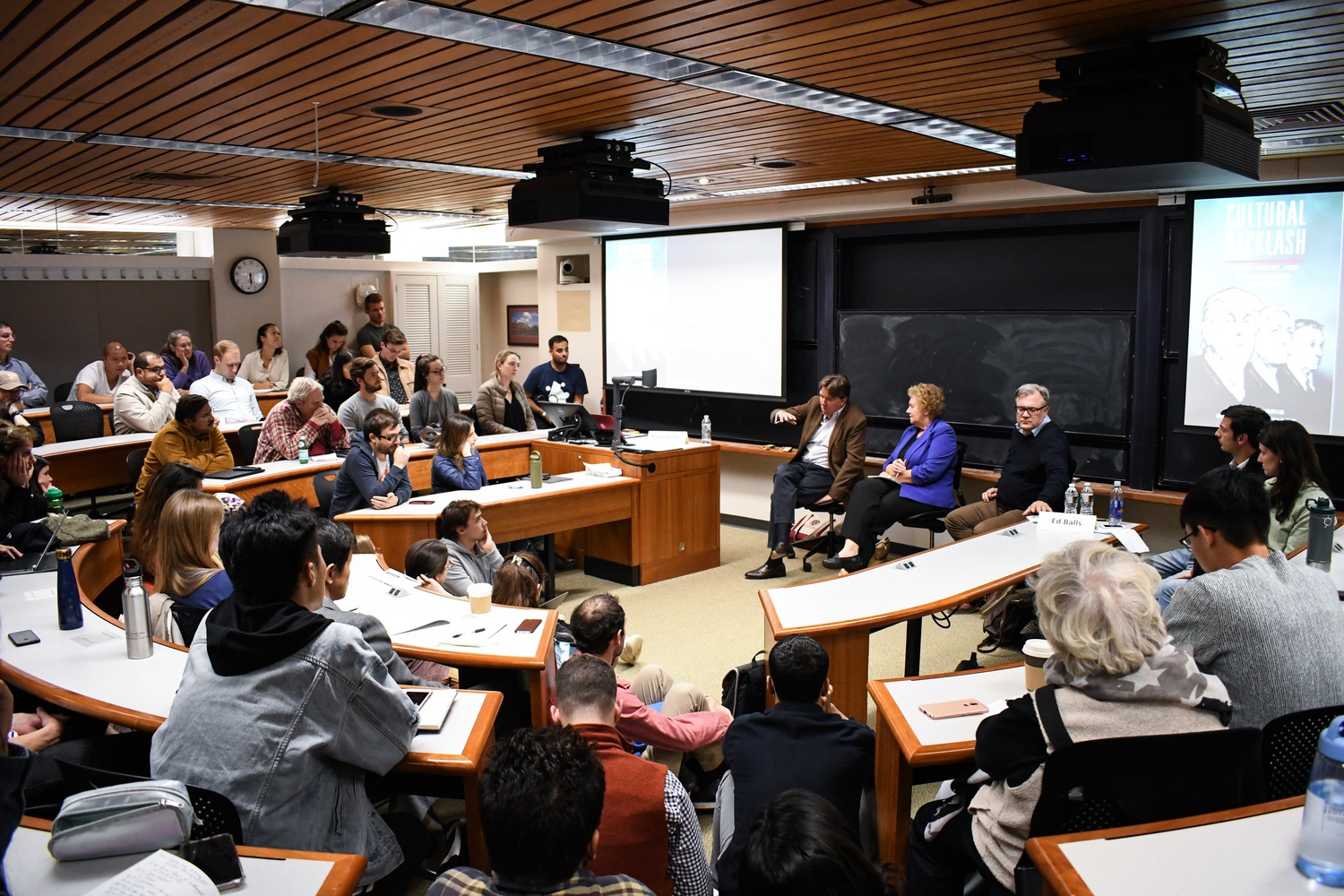
News
Harvard Lampoon Claims The Crimson Endorsed Trump at Pennsylvania Rally

News
Mass. DCR to Begin $1.5 Million Safety Upgrades to Memorial Drive Monday

Sports
Harvard Football Topples No. 16/21 UNH in Bounce-Back Win

Sports
After Tough Loss at Brown, Harvard Football Looks to Keep Ivy Title Hopes Alive

News
Harvard’s Greenhouse Gas Emissions Increased by 2.3 Percentage Points in 2023
HKS Panel Evaluates Causes and Future Implications of Brexit
British policy experts pointed to polarization and rising populist sentiments as causes of the United Kingdom’s vote to leave the European Union — commonly referred to as “Brexit” — during a panel Monday evening at the Harvard Kennedy School of Government.
The panel, entitled “What on Earth is Going on With Brexit,” featured two Kennedy School Research Fellows, former U.K. Shadow Chancellor Edward M. Balls and Systemic Risk Council Chair Paul Tucker, as well as Comparative Politics Lecturer Pippa Norris.
Speaking to more than 100 attendees in a packed lecture hall, Norris opened the panel by discussing the societal underpinnings of the Brexit referendum, describing the conflict as a “perfect storm” and a “challenge of cultural identities.”
“This is about, ‘Are you British or are you European or global?’” Norris said. “It’s about the basic fundamentals, about who you are, and those are things which you can’t compromise about.”
Tucker pointed to the polarization of political parties in the U.K. as another factor influencing the Brexit debate. While many British people have strong opinions regarding Brexit, very few of them have actually joined parties. As a result, their voices are underrepresented within the halls of Parliament, according to Tucker.
“We essentially have political parties that compete to govern who are fringe movements in our society,” Tucker said.
He said that as the two major parties in the U.K. have shifted to the extremes, the voice of centrists has lost weight in both parties, especially on the issue of Brexit.
Balls, who served as a Member of Parliament from 2005 to 2015, remarked that the rise of populist sentiments significantly contributed to the Brexit decision. He said that balancing large-scale changes with an acknowledgement of individual identity would mitigate the influence of these sentiments in future Brexit debates.
“You can’t beat populism with the status quo, but you can’t beat populism by telling people they shouldn’t be proud of who they are,” Balls said. “You have to find a way in which you can have radical change which makes people better off but also allows them to be proud of who they are, their identity, and their place.”
The panelists concluded the event by answering questions from audience members, which covered topics ranging from a possible referendum in Scotland to the risk of exiting the E.U. without a deal.
When asked about the difference between former U.K. Prime Minister Theresa May’s and current U.K. Prime Minister Boris Johnson’s Brexit plans, Tucker said that Johnson’s deal, unlike May’s, would remove the current E.U. regulations governing trade.
Several attendees said they appreciated the depth of the conversation from the three panelists.
“I really enjoyed the different opinions that they had, the way they predicted what might happen and made sense of it, and the points of tension between the speakers,” said Nathan Hodson, a student at the Harvard School of Public Health.
Graduate School of Arts and Sciences student Todd Gillespie said he appreciated the speakers’ depiction of the tumultuous political climate in the U.K.
“I thought it was really informative,” Gillespie said. “[The panel] reflected much of the chaos and indecision and uncertainty that our country is facing at the moment.”
Want to keep up with breaking news? Subscribe to our email newsletter.

